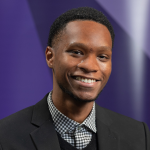Kyle Williams
Kyle Williams (MSJ23)
Sports writer and producer
 Tell me about your career path. How did you get where you are today?
Tell me about your career path. How did you get where you are today?
I’ve wanted to become a writer since I read the ‘Book of Basketball’ by Bill Simmons. With that inspiration, I became the sports editor at my undergraduate student newspaper and interned at the News & Observer in Raleigh, North Carolina, before attending Northwestern. Following graduation from Northwestern, I was hired by the Chicago Sun-Times as a high school sports reporter. On the production side, The Ringer hired me as a freelance producer for its Chicago podcast, ‘The Full Go with Jason Goff,’ which has been a tremendous experience. I have learned how to mix audio and find guests who would fit the show well. I also had excellent mentors — Mirin Fader, Shakeia Taylor, Tony Jones and K.C. Johnson — who helped me improve my writing and were there for support. Juliet Litman helped me see that I could do more than write and expand my skill set.
What are your main responsibilities in your current role?
I’m responsible for providing high school girls basketball coverage for the Chicago Sun-Times. I cover everything from features to game stories. I also chip in on the professional beats throughout the city and write game and feature stories. I've covered every professional team in the city. For The Ringer, I’m responsible for mixing and editing audio and finding guests who would do well on the show.
What is one of your proudest career accomplishments?
An accomplishment I’m most proud of is a feature story I wrote on former Chicago Cubs outfielder Jason Heyward as an intern. He was starting a baseball academy in the Austin neighborhood, and I knew I wanted to write about it. I pitched my editor a story about how Heyward — through his Jay-Z-inspired tattoos and walk-up music — was always himself and how important that representation was for him as a Black baseball player. It was a sports story incorporating music and Heyward as a person, which I felt told a better story.
What does Black History Month mean to you?
Black History Month is a time for others to understand and celebrate those who made sacrifices to get us to this point. It’s also about supporting and amplifying Black voices and allowing them to exist and thrive in spaces we’re generally not in. This month is about celebrating the cultural heritage and the indelible impact we’ve had on this country.
How have your identities influenced the way you navigate your professional career?
My industry can be more inclusive by empowering more Black people in prominent positions. No matter what beat I work on, there is a dearth of Black journalists covering the teams. Particularly in Chicago — which has a unique vibe and vernacular — having people representing the less heralded parts of the city is so important in sports and city coverage. Whether in editor positions or managerial positions, having a prominent Black voice is valuable in journalism.
What advice do you have for someone considering Medill?
I wouldn’t have my foot in the door in this industry if it weren’t for Medill. The alumni network has benefited me in terms of getting advice on how to survive in this industry. Also, it’s essential to push yourself out of your comfort zone — that’s advice I received from a Medill mentor of mine. Try things and be prepared to pivot.

